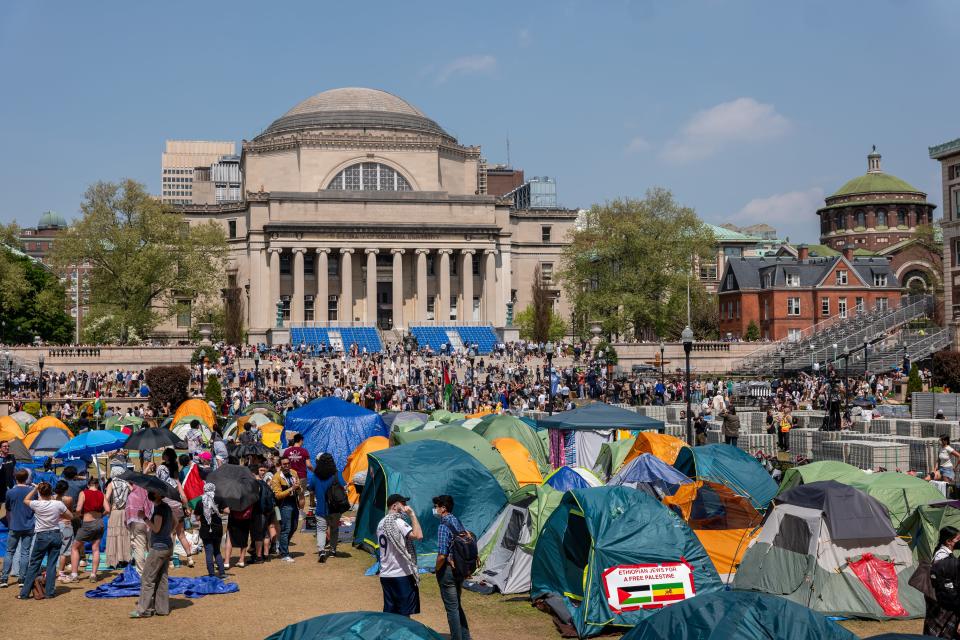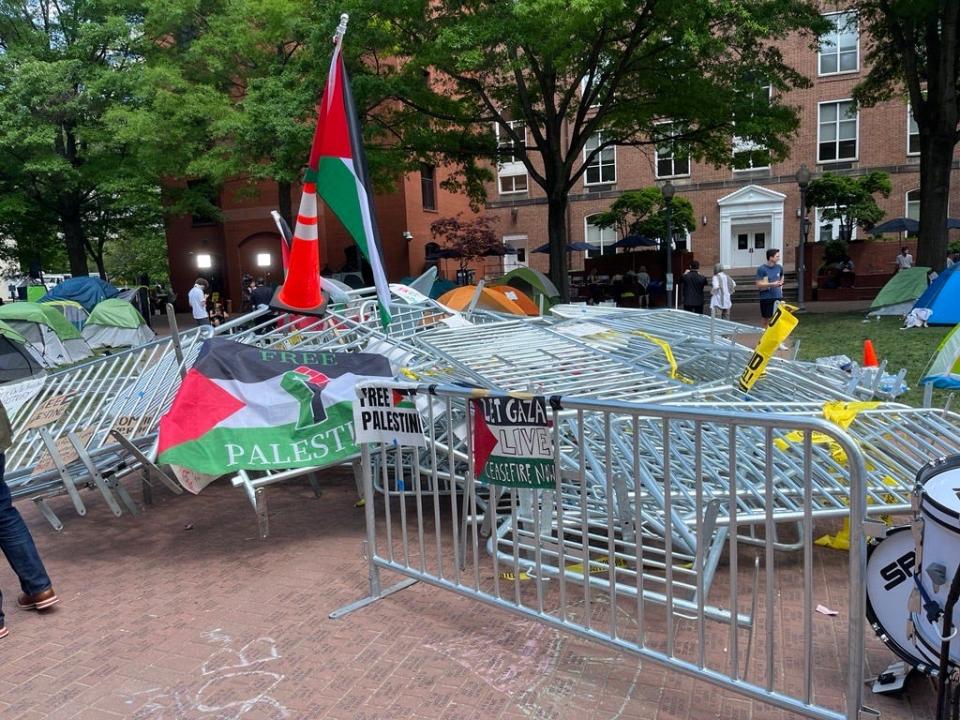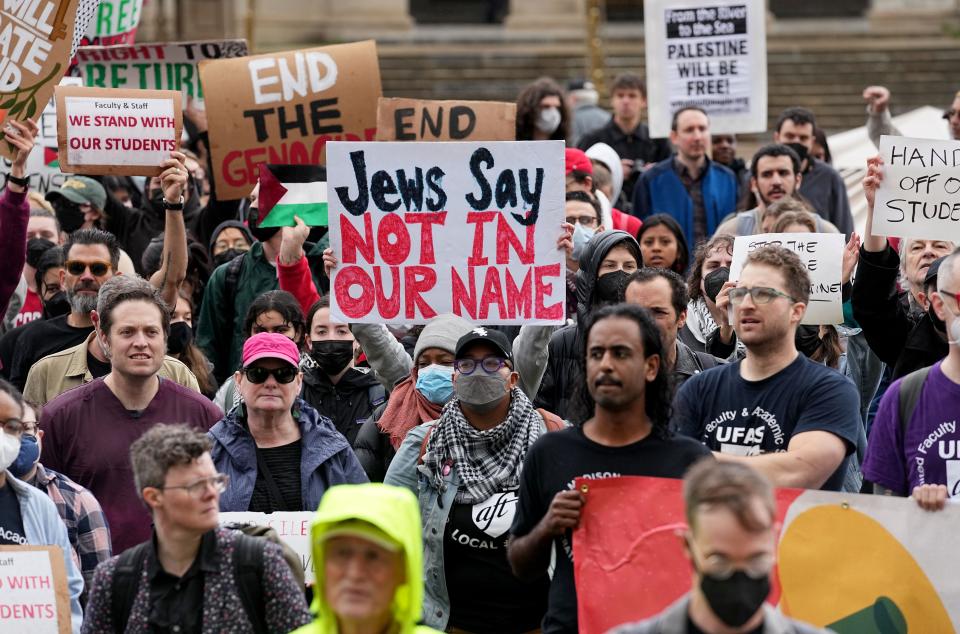Columbia suspends protesting students; demonstrators take over university building: Updates
Editor's Note: This page is a summary of news on college campus protests against the Israel-Hamas war for Monday, April 29. For the latest news on the protests, view our live updates file for Tuesday, April 30.
NEW YORK ? Columbia University's administration said Monday it has begun suspending students hours after demonstrators defied a deadline for clearing the "Gaza Solidarity Encampment" at the center of campus, which fueled similar protests on campuses across the nation.
Spokesperson Ben Chang said the university had notified students they would be suspended if they didn’t vacate the encampment by 2 p.m. ET after the sides failed to reach an agreement earlier in the day. The site, he said, has created an unwelcoming environment for many Jewish students and faculty, and it has been noisy at the center of campus.
Protest organizers note that many demonstrators in their space are Jewish, including several of the 100-plus arrested when the university asked police to break up a smaller encampment on April 18.
“We’ve been suspending students as part of this next phase of our efforts to ensure safety on campus,” said Chang, who did not take questions from reporters or specify the number of students from Columbia and its affiliated Barnard College who were disciplined.
Around the time of the deadline, many students threw notices of the possible suspensions in the trash or put them on the ground to be stepped on. Chang said adjudication over suspensions will be handled by the university senate ? composed of faculty, students, administration, staff and alumni ? as well as the Office of University Life.
The administration cited the need to clear the encampment ahead of upcoming commencement ceremonies May 15, when about 15,000 students will graduate from the Ivy League school.
Columbia protesters demand the school halt investments with companies profiting from Israel's war against Hamas in Gaza, and they want amnesty for students and faculty involved in the protest. College campus demonstrations have ramped up in opposition to the civilian toll in Gaza, where more than 34,000 people have died since the Israeli invasion that followed a Hamas-led attack that killed almost 1,200 people in Israel.

Developments:
? At Ohio State, where more than 40 protesters were arrested last week, school president Ted Carter said in a Monday e-mail the university "will not be overtaken'' like other campuses. Another student demonstration is expected later in the week.
? U.S. schools got support from abroad in protesting the war in Gaza. Demonstrators took to Paris' Sorbonne University on Monday, chanting "Free Palestine" at the university's gates while some students set up tents in the courtyard.
? Video from the Shaboura refugee camp in the southern Gaza city of Rafah shows signs in support of the campus protests, CNN reports. Some read: "Students of Columbia University, continue to stand by us” and “Thank you, students in solidarity with Gaza. Your message has reached (us).”
Columbia demonstrators occupy university building
Columbia demonstrators early Tuesday took to occupying Hamilton Hall, an academic building to the east of the encampment used to protest Israel’s war in Gaza.
After 12:30 a.m., protesters broke into the building and barricaded themselves with wooden chairs, metal tables, and trashcans. People linked arms to form a line protecting the entrance while others picketed, leading chants in support of Gaza and divesting from Columbia.
“This escalation follows yet another sweeping round of threatened suspensions, expulsions and arrests,” a social media post from activist groups organizing the encampment said.
Meanwhile, demonstrators marched around the existing encampment at the center of campus that students have occupied for nearly two weeks. Outside the campus gates, people protested in support of the demonstrators.
Organizers pushing for Columbia University to divest from Israel said they renamed Hamilton Hall to Hind’s Hall in honor of the 6-year-old who appeared to have been killed by Israeli forces in January. Protesters said they plan to remain in the building until Columbia concedes to its longstanding three demands of divestment, financial transparency of investments, and amnesty for all students, staff and faculty disciplined for opposition to Israel’s war and support for Palestine.
"Resistance is justified in the movement for liberation," said the student group Columbia University Apartheid Divestment’s news release released early Tuesday. "Liberators acting in solidarity with Palestine continue to hold themselves to a higher standard than Columbia."
Organizers said they escalated demonstrations because the university has contributed to genocide while refusing to follow “baseline standards of conduct” for negotiations.
Organizers said the encampment is a peaceful form of protest. Demonstrators are tying their action just after midnight Tuesday to prior student movements on Columbia’s campus, including to protest the war in Vietnam as well as apartheid in South Africa. "Taking back our own campus is the only and last response to an institution that obeys neither its own ‘rules’ nor ethical mandates, which is why we began the Gaza Solidarity Encampment."
Still, the organizers warned the administration and trustee not to bring soldiers or police officers, referring to Kent State and Jackson State protests more than 50 years ago that were bloody. "Students’ blood will be on your hands," the statement said.
Protest at University of Texas broken up forcefully
Law enforcement officers arrested at least 30 people in clearing out a small encampment of pro-Palestinian protesters at the University of Texas at Austin on Monday, forcefully pulling away some demonstrators, the Austin American-Statesman reported.
Members of the university and Austin police, along with state troopers in riot gear, initially encircled the approximately 80 protesters, who sat on the ground and linked arms, some of them holding umbrellas to shield from the sun in 85-degree temperatures. Video from the scene showed a handful of demonstrators being taken away with their hands zip-tied behind their backs.
In responding to a post on the X platform, Texas Gov. Greg Abbott, who has taken a hardline stance against the protests, said, "No encampments will be allowed. Instead, arrests are being made.''
The American-Statesman reported only about 20 demonstrators remained in place some three hours after the protest began at the university’s south lawn. Their tents had been dismantled.
The group assembled unexpectedly following two earlier demonstrations around noon. A larger protest at UT Austin was broken up Wednesday when police arrested 57 people, although criminal trespassing charges against them were dropped.
Faculty members 'stand' with Columbia students
Student protesters at Columbia gathered for a rally Monday at the encampment ahead of the university’s 2 p.m. ET deadline to clear out or face suspension. “No business as usual,” demonstrators chanted. “There is only one solution!” and “Intifada revolution!”
“We will not move until Columbia meets our demands or we are moved by force,” a news release from the students said.
They were not alone. Faculty members, donning orange safety vests, joined students in rallying near the encampment. “We salute you, we stand with you,” Shana Redmond, a professor of English and comparative literature, told the crowd from a megaphone. “And we’re so proud to be your professors.”
The encampment has grown since police arrested more than 100 demonstrators April 18. Chris Carr, a doctoral student in astronomy who came by Monday to lend his support, called the protest "a beautiful display of community" and said it would not be a good idea to have police break it up again.
“It seems like every time that they try to like inflict force on us through public safety or through NYPD, the students come out stronger and stronger than ever,” he said. “They can try, but I think the students are strong and united on that.”
At GW in Washington, 'we're being disruptive,' protester says
Posters reading "End all U.S. aid to Israel" and "Resistance is justified in the face of genocide" interspersed the tents covering University Yard, an outdoor square on the Washington, D.C., campus of George Washington University on Monday afternoon. Students sprawled on blankets on the grass and sketched pro-Palestine messages in chalk on the sidewalk as scattered groups of officers with Metropolitan Police Department circled the park.
Officials with the MPD, which operates within the Washington metro area, rejected requests from the university to clear the encampment Friday morning, fearing the optics of a clash with peaceful protesters less than a mile from the White House, the Washington Post reported.
"There is clearly a lot of pressure from the university and the university police for us to leave, because we're being disruptive. And we're being disruptive because there cannot be business as usual during a genocide," said Miriam Siegel, a 19-year-old sophomore at Georgetown University who said she joined the encampment Thursday at around 5 a.m. when tents first went up in the square.
At the center of the square, a Palestinian flag propped up by an orange security cone sat atop a tangled pile of security barriers. According to local news reports, student protesters pushed through a police barrier set up on one side of the park Sunday night.
"We have seen some police aggression," Siegel said. "We know that the cops aren't here to keep us safe. We're here to keep each other safe."
? Cybele Mayes-Osterman

Two speakers withdraw from USC graduation programs
Author Pam Zhang and educator Safiya Noble have withdrawn as keynote speakers at the University of Southern California's Rossier’s doctoral and master’s commencement ceremonies. In an open letter to the school, Zhang and Noble criticized USC for failing to conduct good-faith talks with student protesters and for bringing armed LAPD officers onto campus to break up a pro-Palestinian encampment.
The duo also lashed out at USC for canceling a commencement speech by valedictorian Asna Tabassum after pro-Israel groups objected to Tabassum's support for Palestinians on social media. USC later canceled its primary undergraduate commencement, but some satellite ceremonies are taking place.
“To speak at USC in this moment would betray not only our own values, but USC’s too … We cannot overlook the link between recent developments and the ongoing genocide in Palestine,” Zhang and Noble said.

Suspensions, campus bans an option at George Washington
George Washington University officials have notified students that suspensions and campus bans are among the options they'll consider to clear their encampment at University Yard, which they say violates school rules.
“As we approach the end of the academic year, our ability to operate in a way that ensures the academic success and personal well-being of our community becomes even more critical,’’ officials said in an e-mail.
Metropolitan police have been stationed at the protest site in the square, where school activities like festivals are sometimes held. Earlier in the protest, a statue of George Washington at the entrance was draped with a Palestinian flag.
Some students have been bringing food and other supplies, including blankets, to their protesting peers in the tents. Outside the encampment, others brought boxes of pizza and pans of food, including rice and falafel.
Meanwhile, classes are still underway as finals approach. The beating of drums and chanting could be heard in some classrooms.
? Deborah Berry
Police break up 3-day protest at Virginia Tech
Blankets, trash and antiwar placards were all that remained Monday of a pro-Palestinian encampment at Virginia Tech, hours after school officials cited an "increasing potential to become unsafe" and called in police to disband the three-day protest. The school, 260 miles southwest of Washington, D.C., becomes the latest in a growing line of universities to take police action to curb protests of Israel's war in Gaza.
"Through constant dialogue between university officials, the Virginia Tech Police Department and protest organizers, we were able to maintain a safe and peaceful environment through much of the weekend," the school said in a statement, adding that the protest continued to grow. "Given these actions by protesters, the university recognized that the situation had the increasing potential to become unsafe."
The protesters were told to disperse voluntarily and warned that those who remained would be charged with trespassing, the statement said.
"I transferred to Virginia Tech, hoping to find a (supportive) environment, which I did, but unfortunately it has disappointed me over and over and over again," Palestinian student Fatima Hasan told WSET-TV.
Virginia Tech police referred USA TODAY to a school spokesperson who did not immediately respond to a request for information on the number of arrests and other details of the police action.
Pro-Palestinian protesters urge universities to divest from Israel. What does that mean?
What are college protests across the US about?
The student protesters opposed to Israel's military attacks in Gaza say they want their schools to stop funneling endowment money to Israeli companies and other businesses, like weapons manufacturers, that profit from the war in Gaza. In addition to divestment, protesters are calling for a cease-fire, and student governments at some colleges have also passed resolutions in recent weeks calling for an end to academic partnerships with Israel. The protesters also want the U.S. to stop supplying funding and weapons to the war effort.
More recently, amnesty for students and professors involved in the protests has become an issue. Protesters want protections amid threats of disciplinary action and termination for those participating in demonstrations that violate campus policy or local laws.
? Claire Thornton
Contributing: Reuters
This article originally appeared on USA TODAY: College protests updates: Columbia demonstrators take over building
